Democratic presidential candidate Bernie Sanders is proposing a criminal justice overhaul that aims to cut the nation's prison population in half, end mandatory minimum sentencing, ban private prisons and legalize marijuana. He says the current system does not fairly treat people of color, addicts or the mentally ill.
"We have a system that imprisons and destroys the lives of millions of people," Sanders told The Associated Press before the planned released of his proposal Sunday. "It's racist in disproportionately affecting the African American and Latino communities, and it's a system that needs fundamental change."
Sanders was promoting the plan during a weekend of campaigning in South Carolina, where the majority of the Democratic electorate is African American. The Vermont senator, who won the support of some younger black Democrats during the 2016 primary, has stepped up his references to racial disparities, particularly during stops in the South and urban areas.
As president, Sanders said he would abolish mandatory minimum sentencing and reinstate a federal parole system, end the "three strikes law" and expand the use of alternative sentencing, including community supervision and halfway houses. The goal is to reduce the prison population by one-half.
"A very significant number of people who are behind bars today are dealing with one form or another of illness," Sanders said. "These should be treated as health issues, not from a criminal perspective."
According to the National Alliance on Mental Illness , 2 million people with mental illness are booked into jails annually.
Taking aim at what his proposal calls "for-profit prison profiteering," Sanders would ban private prisons, make prison phone calls and other inmate communications free, and audit prison commissaries for price gouging and fees.
The plan would legalize marijuana and expunge previous marijuana convictions, and end a cash bail system that Sanders says keeps hundreds of thousands who have not been convicted of a crime languishing in jail because they cannot afford bail.
"Can you believe that, in the year 2019, 400,000 people are in jail awaiting a trial because they are poor?" Sanders said. "That is a moral outrage, it is a legal outrage."
According to the Prison Policy Initiative , more than 460,000 people are being held in local jails around the country while they await trial, with a median bail amount of $10,000 for felony offenses.
Sanders wants to improve relations between law enforcement agencies and the communities they serve. To do that, he proposes to end federal programs that provide military equipment to local police forces, establish federal standards for the use of body cameras, provide bias training and require that the Justice Department review all officer-involved shootings.
"You have a lot of resentment in minority communities all over this country, who see police forces not as an asset but as an invading force," Sanders said.
On capital punishment, Sanders' plan formalizes his call to end the federal death penalty and urges states to eliminate the punishment as well.
"When we talk about violence in society and trying to lower the levels of violence, it is not appropriate that the state itself is part of capital punishment," Sanders said.
Sanders said that over the long term, his plan will save the public money because of reductions to overall incarceration costs.
"It will cost money but it will pay for itself many, many times over," Sanders said. "Locking people up is very, very expensive."
Kinnard can be reached at http://twitter.com/MegKinnardAP
UNITED NATIONS (AP) — The United States vetoed a widely backed U.N. resolution Thursday that would have paved the way for full United Nations membership for Palestine, a goal the Palestinians have long sought and Israel has worked to prevent.
The vote in the 15-member Security Council was 12 in favor, the United States opposed and two abstentions, from the United Kingdom and Switzerland. U.S. allies France, Japan and South Korea supported the resolution.
The strong support the Palestinians received reflects not only the growing number of countries recognizing their statehood but almost certainly the global support for Palestinians facing a humanitarian crisis caused by the war in Gaza, now in its seventh month.
The resolution would have recommended that the 193-member U.N. General Assembly, where there are no vetoes, approve Palestine becoming the 194th member of the United Nations. Some 140 countries have already recognized Palestine, so its admission would have been approved, likely by a much higher number of countries.
U.S. deputy ambassador Robert Wood told the Security Council that the veto “does not reflect opposition to Palestinian statehood but instead is an acknowledgment that it will only come from direct negotiations between the parties."
The United States has “been very clear consistently that premature actions in New York — even with the best intentions — will not achieve statehood for the Palestinian people,” deputy State Department spokesman Vedant Patel said.
His voice breaking at times, Palestinian U.N. Ambassador Riyad Mansour told the council after the vote: “The fact that this resolution did not pass will not break our will and it will not defeat our determination.”
“We will not stop in our effort,” he said. “The state of Palestine is inevitable. It is real. Perhaps they see it as far away, but we see it as near.”
This is the second Palestinian attempt for full membership and comes as the war in Gaza has put the more than 75-year-old Israeli-Palestinian conflict at center stage.
Palestinian President Mahmoud Abbas first delivered the Palestinian Authority’s application for U.N. membership in 2011. It failed because the Palestinians didn’t get the required minimum support of nine of the Security Council’s 15 members.
They went to the General Assembly and succeeded by more than a two-thirds majority in having their status raised from a U.N. observer to a non-member observer state in 2012. That opened the door for the Palestinian territories to join U.N. and other international organizations, including the International Criminal Court.
Algerian U.N. Ambassador Amar Bendjama, the Arab representative on the council who introduced the resolution, called Palestine’s admission “a critical step toward rectifying a longstanding injustice" and said that “peace will come from Palestine’s inclusion, not from its exclusion.”
In explaining the U.S. veto, Wood said there are “unresolved questions” on whether Palestine meets the criteria to be considered a state. He pointed to Hamas still exerting power and influence in the Gaza Strip, which is a key part of the state envisioned by the Palestinians.
Wood stressed that the U.S. commitment to a two-state solution, where Israel and Palestine live side-by-side in peace, is the only path for security for both sides and for Israel to establish relations with all its Arab neighbors, including Saudi Arabia.
“The United States is committed to intensifying its engagement with the Palestinians and the rest of the region, not only to address the current crisis in Gaza, but to advance a political settlement that will create a path to Palestinian statehood and membership in the United Nations,” he said.
Mansour, the Palestinian U.N. ambassador, reiterated the commitment to a two-state solution but asserted that Israel believes Palestine "is a permanent strategic threat."
"Israel will do its best to block the sovereignty of a Palestinian state and to make sure that the Palestinian people are exiled away from their homeland or remain under its occupation forever,” he said.
He demanded of the council and diplomats crowded in the chamber: “What will the international community do? What will you do?”
Israeli-Palestinian negotiations have been stalled for years, and Israel’s right-wing government is dominated by hard-liners who oppose Palestinian statehood.
Israeli U.N. Ambassador Gilad Erdan called the resolution “disconnected to the reality on the ground” and warned that it “will cause only destruction for years to come and harm any chance for future dialogue.”
Six months after the Oct. 7 attack by the Hamas militant group, which controlled Gaza, and the killing of 1,200 people in “the most brutal massacre of Jews since the Holocaust,” he accused the Security Council of seeking “to reward the perpetrators of these atrocities with statehood.”
Israel’s military offensive in response has killed over 32,000 Palestinians, according to Gaza’s health ministry, and destroyed much of the territory, which speaker after speaker denounced Thursday.
After the vote, Erdan thanked the United States and particularly President Joe Biden “for standing up for truth and morality in the face of hypocrisy and politics.”
He called the Palestinian Authority — which controls the West Bank and the U.S. wants to see take over Gaza where Hamas still has sway — “a terror supporting entity.”
The Israeli U.N. ambassador referred to the requirements for U.N. membership – accepting the obligations in the U.N. Charter and being a “peace-loving” state.
“How can you say seriously that the Palestinians are peace loving? How?” Erdan asked. “The Palestinians are paying terrorists, paying them to slaughter us. None of their leaders condemns terrorism, nor the Oct. 7 massacre. They call Hamas their brothers.”
Despite the Palestinian failure to meet the criteria for U.N. membership, Erdan said most council members supported it.
“It’s very sad because your vote will only embolden Palestinian rejectionism every more and make peace almost impossible,” he said.
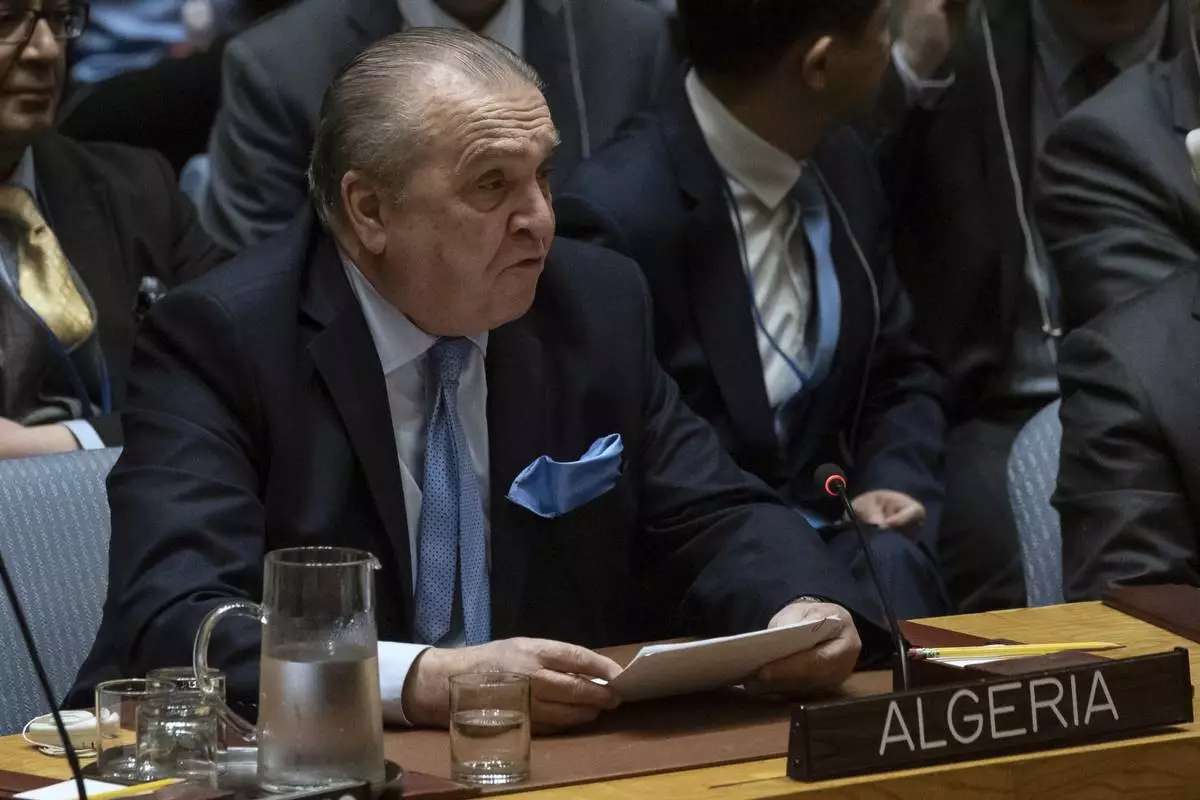
Algeria's Permanent Ambassador to the United Nations Amar Bendjama speaks during a Security Council meeting at United Nations headquarters, Thursday, April 18, 2024. (AP Photo/Yuki Iwamura)
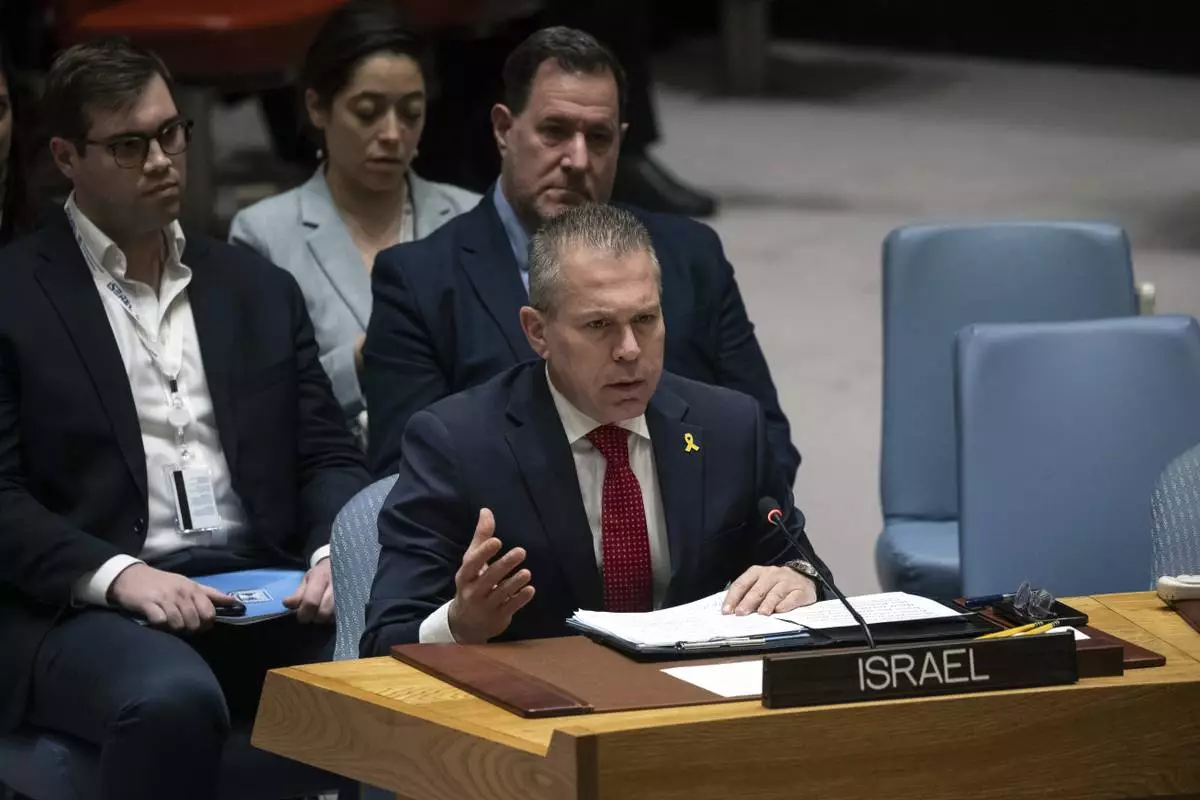
Israeli Ambassador to the United Nations Gilad Erdan speaks during a Security Council meeting at United Nations headquarters, Thursday, April 18, 2024. (AP Photo/Yuki Iwamura)
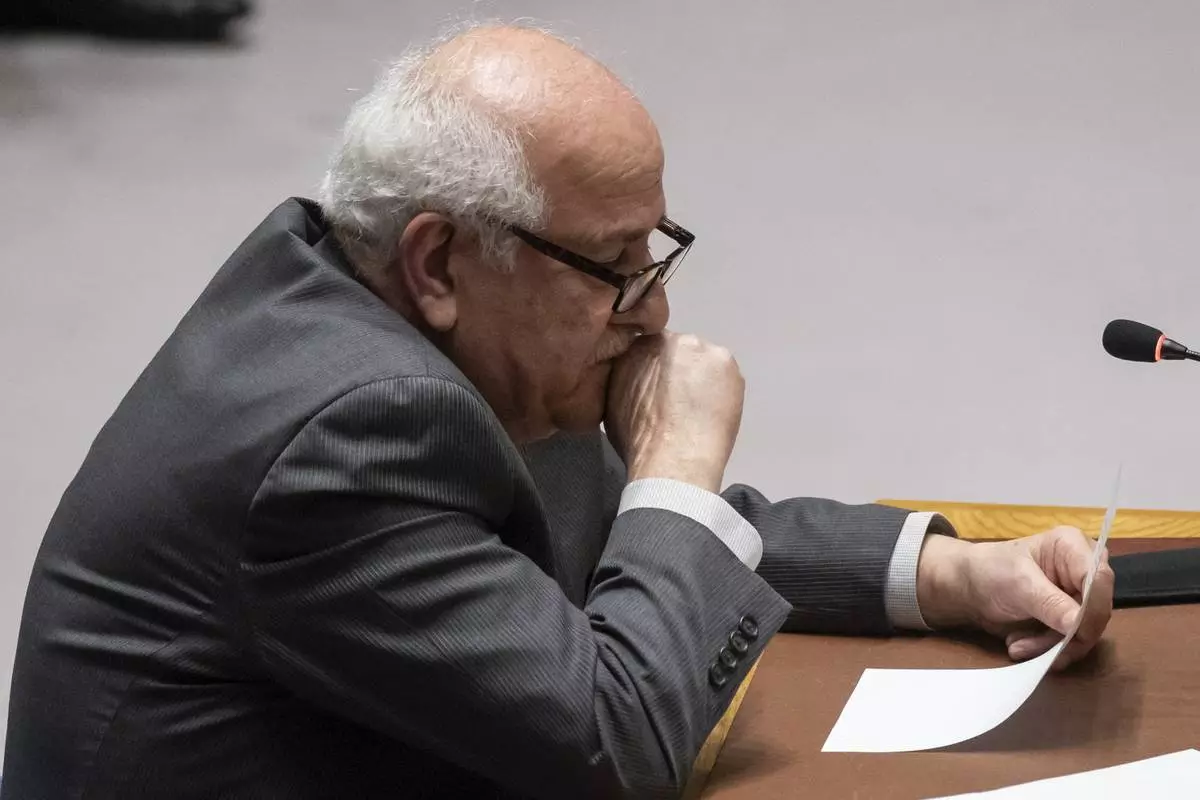
Palestinian Ambassador to the United Nations Riyad Mansour holds tears while speaking during a Security Council meeting at United Nations headquarters, Thursday, April 18, 2024. (AP Photo/Yuki Iwamura)
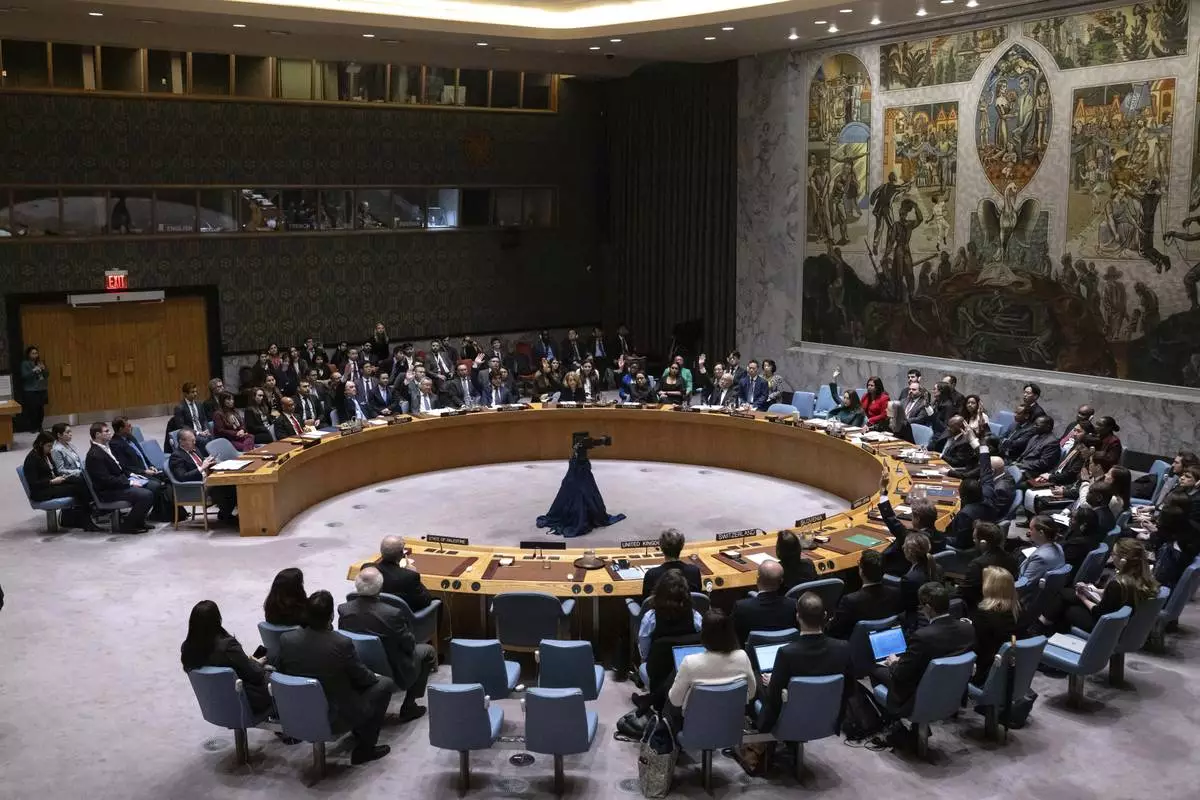
Representatives of member countries take votes during a Security Council meeting at United Nations headquarters, Thursday, April 18, 2024. (AP Photo/Yuki Iwamura)
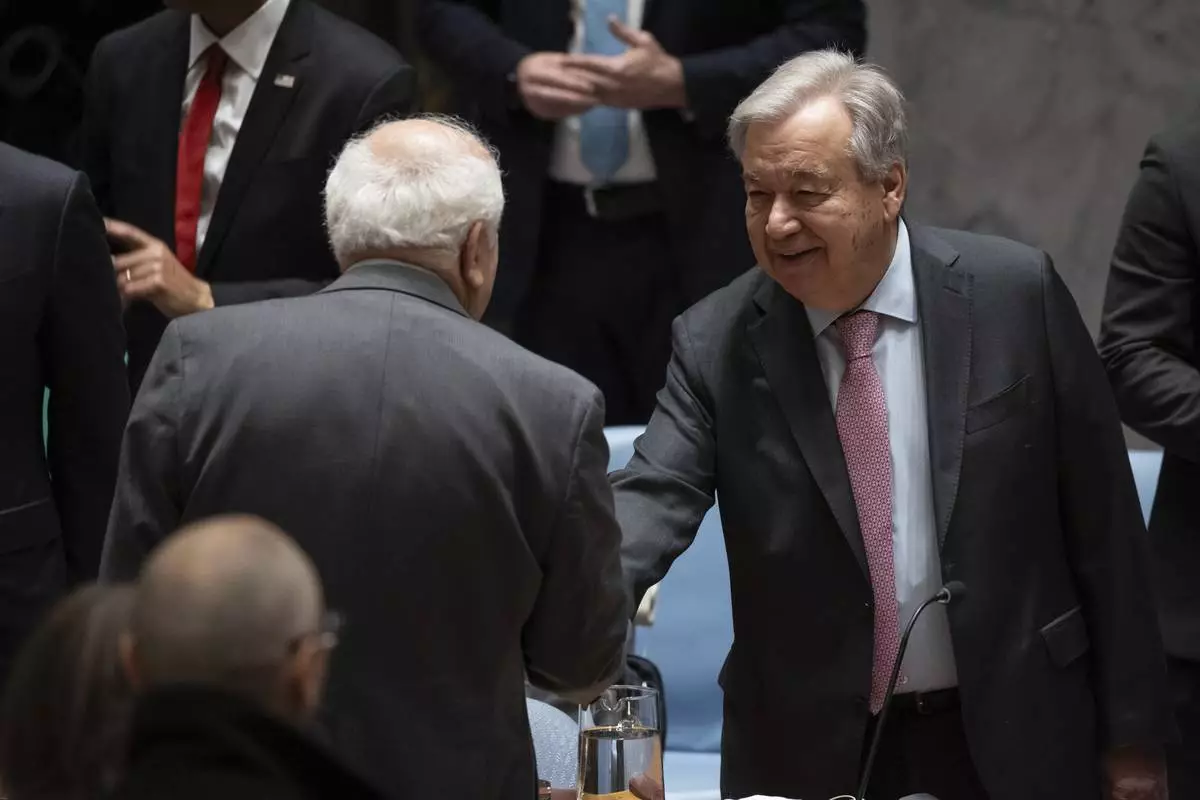
Palestinian Ambassador to the United Nations Riyad Mansour, left, and United Nations Secretary-General Antonio Guterres speak before a Security Council meeting at the United Nations headquarters, Thursday, April 18, 2024. (AP Photo/Yuki Iwamura)
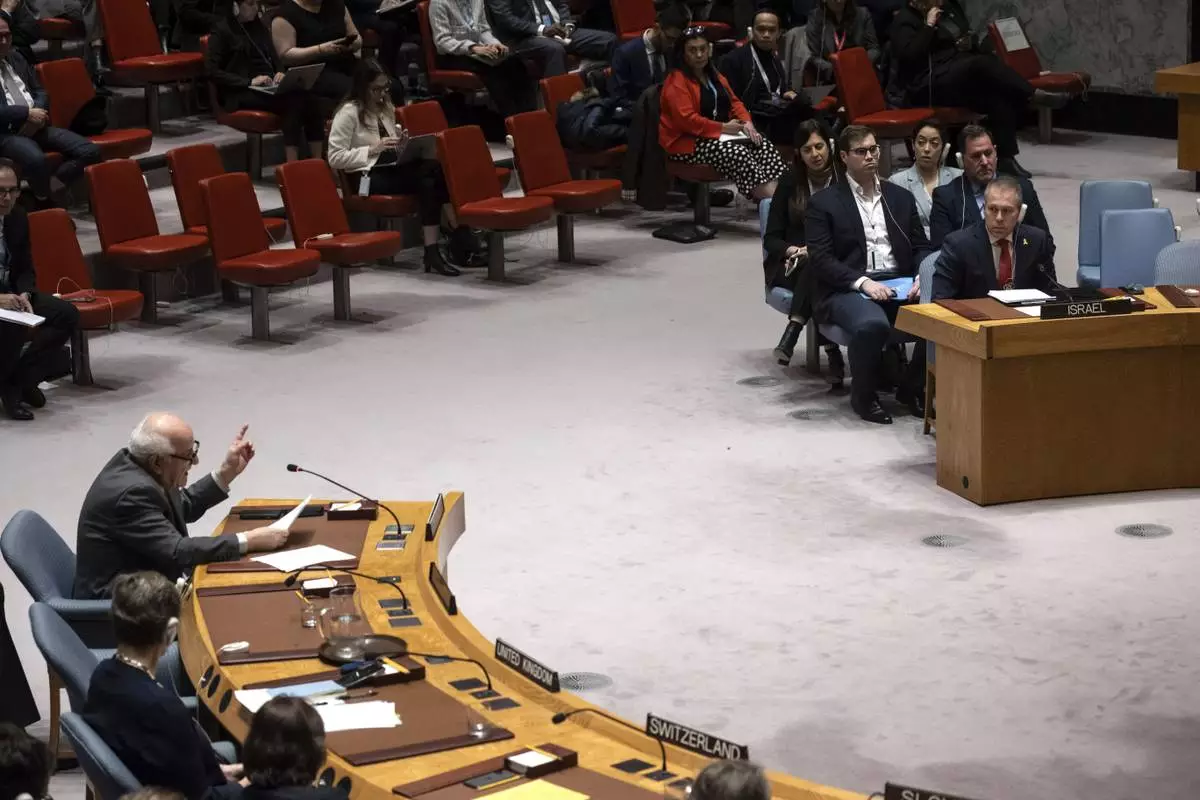
Palestinian Ambassador to the United Nations Riyad Mansour speaks during a Security Council meeting at United Nations headquarters, Thursday, April 18, 2024. (AP Photo/Yuki Iwamura)
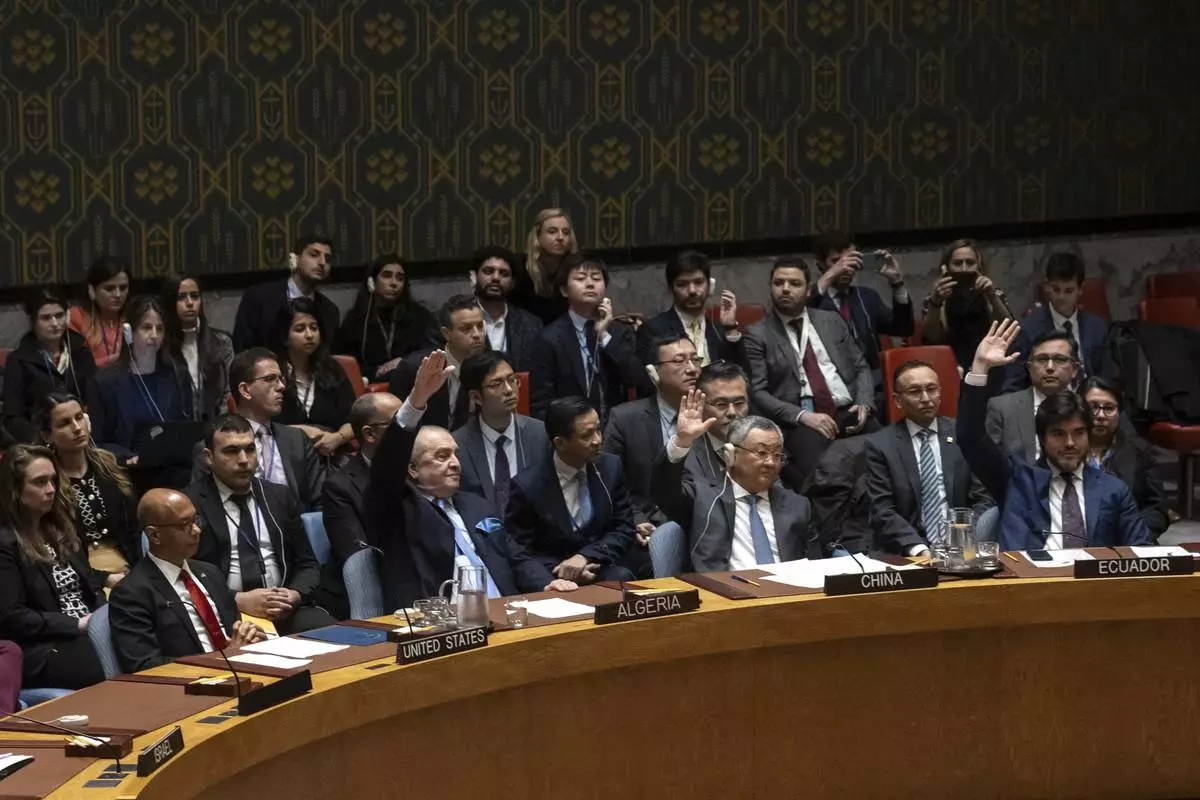
Representatives of member countries take votes during a Security Council meeting at United Nations headquarters, Thursday, April 18, 2024. (AP Photo/Yuki Iwamura)
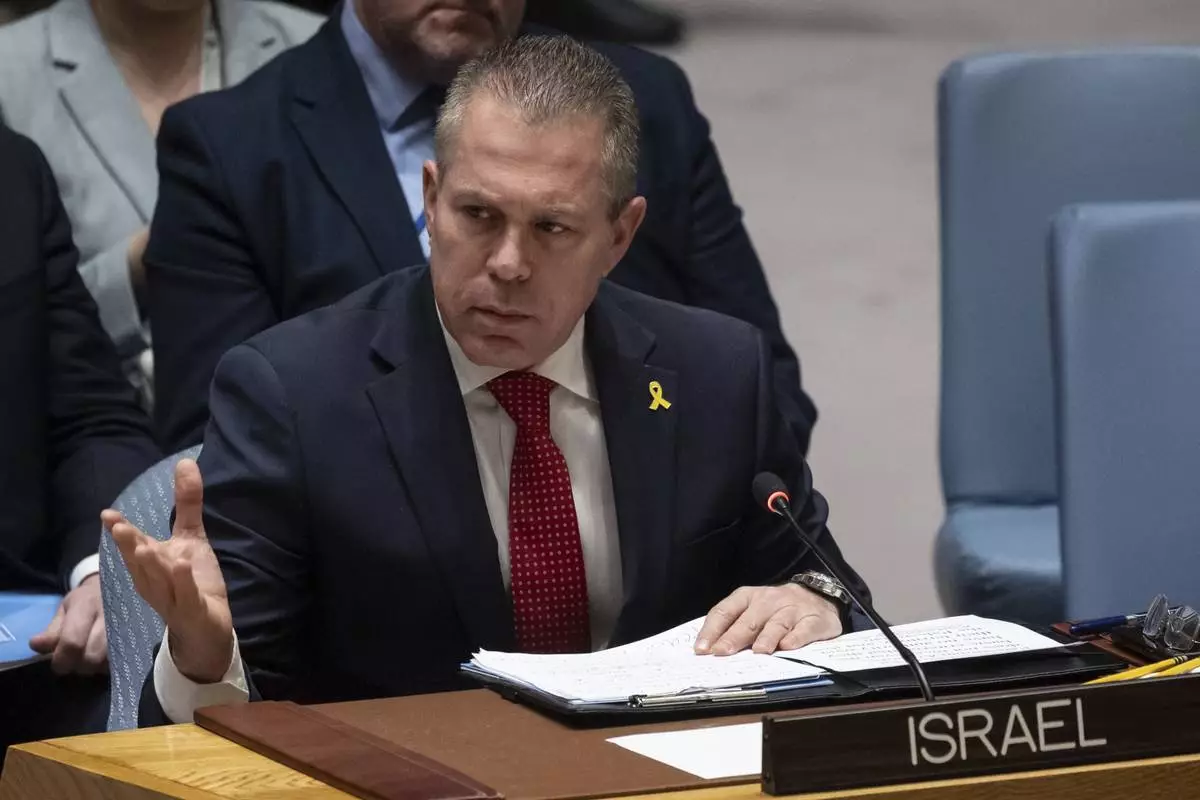
Israeli Ambassador to the United Nations Gilad Erdan speaks during a Security Council meeting at United Nations headquarters, Thursday, April 18, 2024. (AP Photo/Yuki Iwamura)
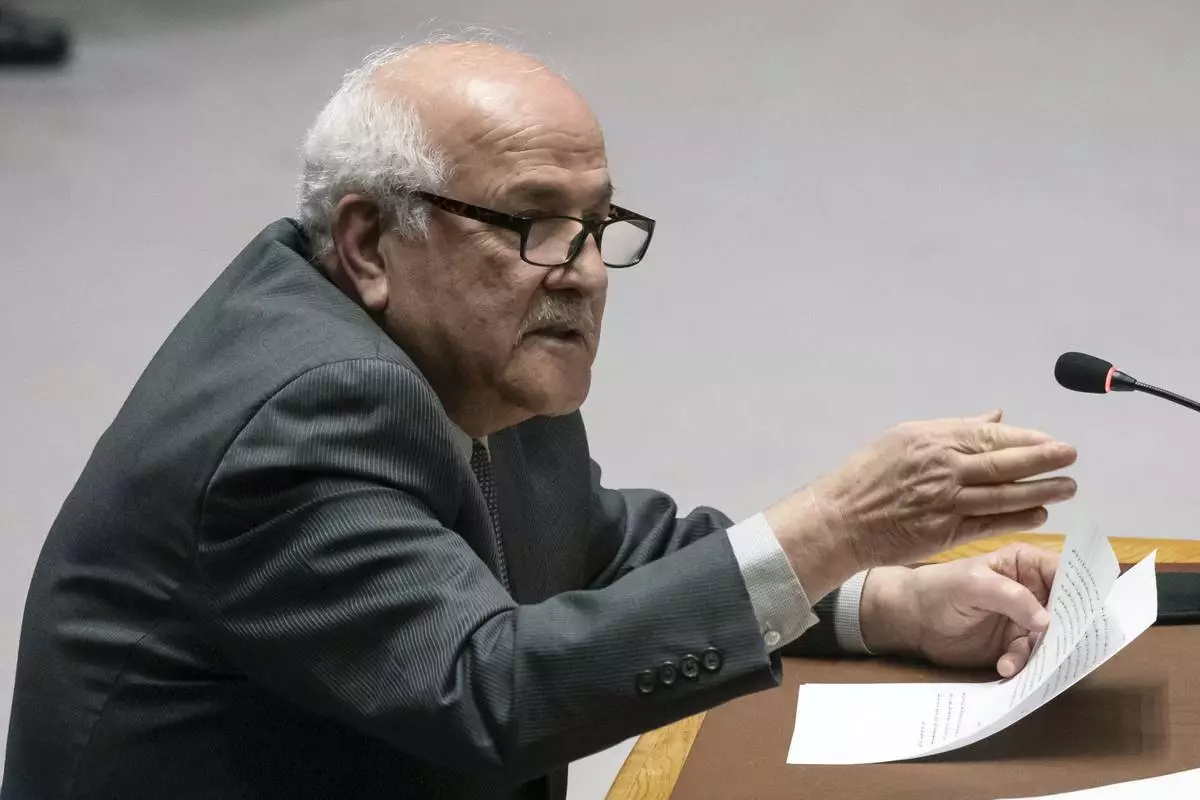
Palestinian Ambassador to the United Nations Riyad Mansour speaks during a Security Council meeting at United Nations headquarters, Thursday, April 18, 2024. (AP Photo/Yuki Iwamura)
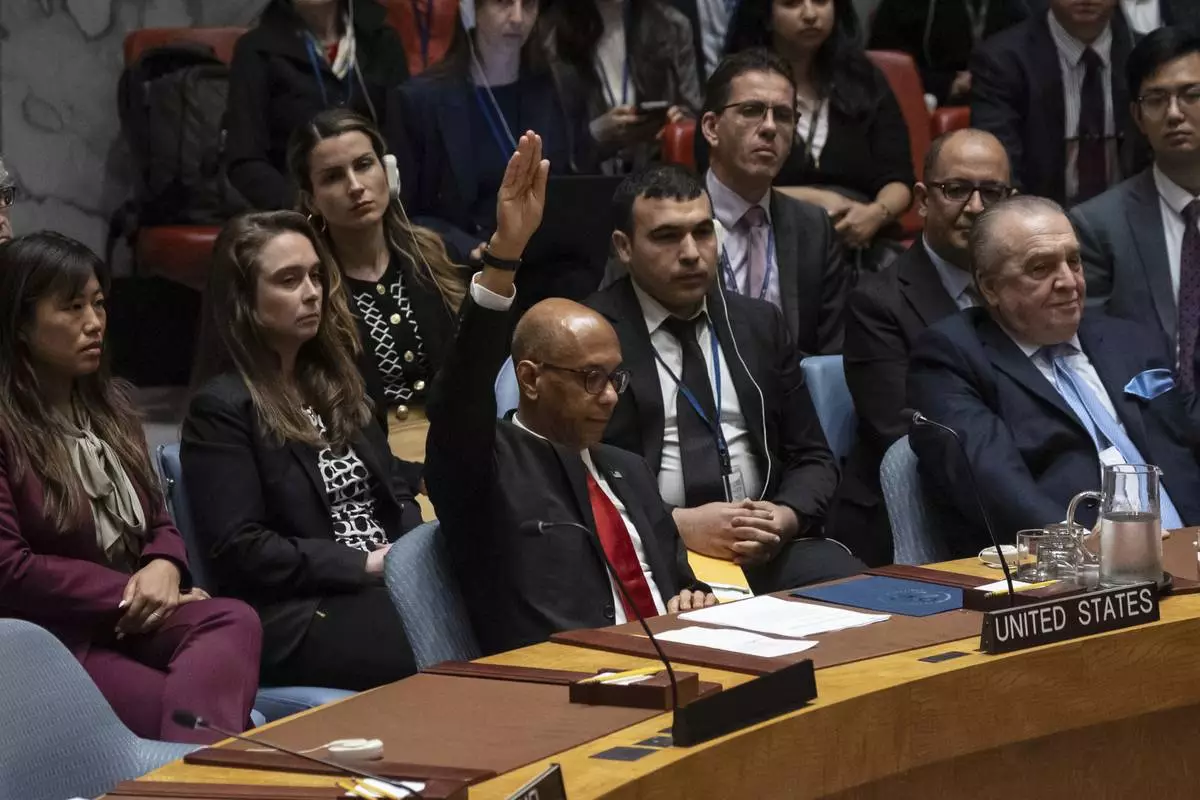
U.S. Deputy Ambassador Robert Wood votes against resolution during a Security Council meeting at United Nations headquarters, Thursday, April 18, 2024. (AP Photo/Yuki Iwamura)



















